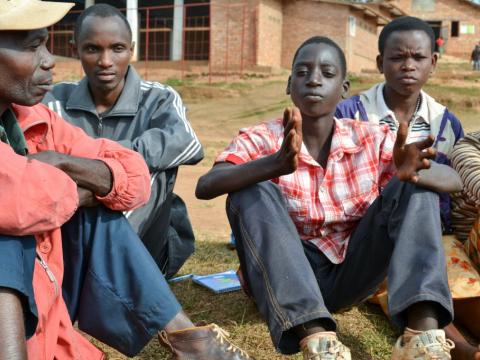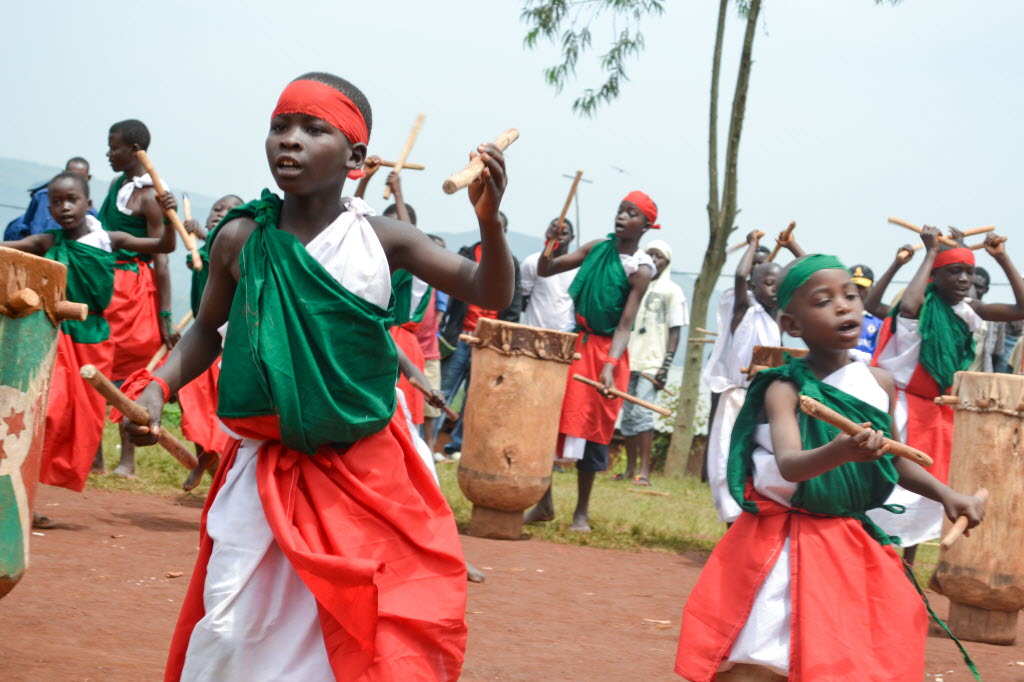Beating Discrimination through culture

While Burundi is recovering from a long ethnic war, it is still sensitive to talk about the responsibilities of the different ethnic groups in the massacres that made the country lose more than 300,000 lives. One of the causes of the massacres at a large scale is that there were gaps between the different community members. Recently World Vision launched its Peace Building project to help community members to come together through cultural clubs. Rapidly, that project is contributing to good cohabitation and development in communities. The more all the ethnic groups come together in the clubs, the less the gaps separate them.
“We start by games. After games we sit down and discuss, talking about things that can be the source of insecurity for children,” says Vianney, a 12-year-old in grade 6.
Vianney takes the lead in his community of Rutegama, in central Burundi. He is the president of Flame of Peace club at his school.
The flame of peace clubs are also teaching children conflicts resolution and human rights, especially rights for children, he explains.
“People like games, most of our messages of peace pass through songs, dance and other cultural performances,” he says.
As he talks a 65-year-old man sitting in the middle of the club members is nodding his head to approve what Vianney is saying. Zacharie is his name, a community member of Rutegama.
In Africa, old age equals wisdom, and an old person is considered as a library. Zacharie Banderembako frequently joins the youth when they meet. He recounts fairy tales, proverbs, idioms and other cultural elements. He afterwards asks them to draw lessons from them and to ask questions.
“This is what our ancestors used to do every night. We grew up around the fire, listening to old people recounting fairy tales and other cultural elements full of life lessons, among them humility and love of the neighbour,” Zacharie explains.
“This is the school we had and it worked well, nothing can prevent us from continuing to do it,” he says with a laugh.
The Flame of Peace clubs are hosting children from the different ethnic groups. The fact of coming together breaks the barriers that were between them. Unfortunately the barriers were coming from some adults.
“My mother told me that parents were preventing their children to befriend with their peers from other ethnic groups,” says Nsabimana Virginie, a 15-year-old girl living on Kaniga hill in the same community.
Her mother told her this when she saw Virginie frequently coming home from her Flame of Peace club with a child from the different ethnic group. Fortunately her mother does not forbid her to befriend that child, she instead likes it. She says she does not want to see again what she witnessed during the crisis, Virginie says.
Virginie thinks that this is maybe what brought the youth to kill each other when the crises broke out. The more children come together in the cultural clubs, the more they develop compassion towards others and are willing to support each other.
“I recently learned that an old woman neighbour to my family who keeps asking for children, who can go to stay with her, is lonely because all her children and husband were killed during the recent crisis. This saddens me a lot,” says 16-year-old, Jeanine Harumugisha.
World Vision Burundi has found that the peace building projects contribute to a good cohabitation among communities but also is contributing to development.
“In less than one year, it has started bearing fruit. Children themselves recently came up with an idea that touched me a lot. They proposed to make bricks in order to construct a house of a vulnerable old woman from Batwa ethnic group,” says Dieudonne Bukuru, World Vision Burundi Peace Building Coordinator
Community members find that there is a need to fight against all sorts of divisions between people before they generate bad consequences.
“Power sharing in the past caused turmoil by the past, poor and rich or any other injustice can cause another civil unrest. There is a need to address all sorts of injustices to avoid this,” considers Eric Havyarimana, a peace community mobiliser for World Vision.
